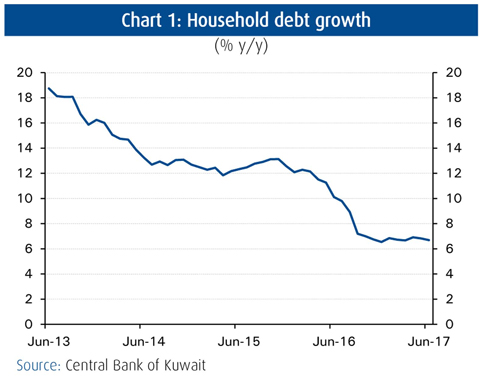 KUWAIT: Kuwait's consumer sector appeared to stabilize and show some early signs of recovery in 2017, following a noticeable slowdown in 2016. Lower oil prices and some fiscal adjustment negatively impacted the consumer sector in 2016. Although we are seeing stabilization and some recovery in card spending, consumer confidence and household credit, most consumer indicators remain noticeably weak in 2017 and far below the double-digit growth of previous years. Nonetheless, employment remains healthy, providing support to the sector, despite the moderation in government hiring.
KUWAIT: Kuwait's consumer sector appeared to stabilize and show some early signs of recovery in 2017, following a noticeable slowdown in 2016. Lower oil prices and some fiscal adjustment negatively impacted the consumer sector in 2016. Although we are seeing stabilization and some recovery in card spending, consumer confidence and household credit, most consumer indicators remain noticeably weak in 2017 and far below the double-digit growth of previous years. Nonetheless, employment remains healthy, providing support to the sector, despite the moderation in government hiring.
Consumer spending growth bounced back in 2Q17, but remained below the 2015 pace. Spending growth on credit and debit cards at point-of-sale machines improved to 9.1 percent year-on-year (y/y) during the second quarter, up from 4.3 percent y/y in 2Q16. Growth in total spending including ATM withdrawals, which has been slower, has also been improving, accelerating to 4.9 percent y/y in 2Q17.
Despite the improvement, durable goods have yet to show signs of stabilization. The auto market has been struggling and sales are estimated to have retreated by 20-25 percent in 2016 and a further 12 percent during the first half of 2017. Noticeable weakness in durable goods purchases continued to be reflected in the Ara consumer confidence index. The durable goods sub-index soared in July and the 3-month average was still down 10 percent y/y.
Nonetheless, there has been steady albeit slow improvement in consumer confidence over the last 12 months. Despite some weakness in the beginning of the year, the Ara general index has managed to remain above the 100 point benchmark since May 2017. It rose to 106 in July. The index had been on a downward trend for four years and fell more rapidly in 2016 after the government hiked fuel prices. Despite the improvement in 2017, the 12-month average remained down 6 percent y/y.
The slow improvement in consumer confidence appears to be helping stabilize household loan growth in 2017. In fact, the growth in household lending, which had also slowed in 2016, has steadied in 2017. Growth in personal facilities excluding credit for the purchase of securities has averaged 6.8 percent y/y in 1H17, compared to an average of 11.8 percent growth in 1H16. The average monthly gain in such loans rose to KD 59 million so far in 2017, compared to a KD 54 million average during the first half of 2016. Employment growth among Kuwaitis, which has held up quite well in recent quarters, appeared to moderate in 1Q17. The number of new civilian jobs among Kuwaitis dipped below 3,000 for the first time in three years, according to the latest figures from the Public Institute for Social Security. With private and oil sector jobs steady or improving, the weakness came from the public sector, which only added around 8,900 jobs during FY16/17, 17 percent lower than the previous year. The sector saw employment growth slip to 2 percent y/y, its slowest pace in over seven years.
Meanwhile, non-Kuwaiti employment growth retreated to below 4 percent y/y during 1H17 after holding up above 5 percent for over two years.
The consumer sector is likely to recover further in 2017. The recent decision to implement more moderate hikes in utility prices and the slow recovery in the real estate market activity, combined with a government commitment to limit its spending cuts, should continue to provide decent support to the consumer sector.
NBK ECONOMIC REPORT










